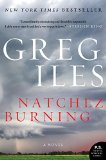Summary | Excerpt | Discuss | Reviews | Readalikes | Genres & Themes | Author Bio

A Penn Cage Novel, Natchez Burning Trilogy #1
by Greg Iles
Albert raised his hand and gave Deputy DeLillo an exaggerated shake of his head, indicating that he'd seen neither hide nor hair of his employee. For a few paralyzed seconds, Albert worried that DeLillo would come inside to question him again, which would lead to the big deputy kicking open the door that separated him from the loudly copulating couple, and then to death for either DeLillo or Willie Hooks. The violent repercussions of Willie killing the deputy were almost unthinkable. Thankfully, after a few awful seconds, Big John waved his mitt and drove on. An invisible band around Albert's chest loosened, and he remembered to breathe.
He wondered how Pooky was doing. The fool of a boy had been hiding in the Hammond when his girlfriend's father and a Klansman named Frank Knox had burst into the store, cursing Albert for "fomenting miscegenation" and threatening to kill him if he didn't produce Pooky Wilson. Albert had summoned all his courage and lied with the sincerity of Lucifer himself; if he hadn't, both he and Pooky would already be dead.
As the bedsprings sang in the back of the store, Albert prayed as he never had before. He prayed that the Klan hadn't stationed anybody outside to watch his store. He prayed that Willie and the schoolteacher would finish soon, would get away clean, and that darkness would fall. Anything less meant the end for all of them, except maybe the white woman.
The sofa springs groaned at about E above middle C, so Albert tuned his voice to their accompaniment. "There was two hundred folks a-dancin'," he belted as he negotiated his way through the pianos in the display room, "laughin', singin' to beat the band." He'd already run out of verses, so he'd taken to making up his own, describing the tragic fire that would likely have killed him, had he not been away in the navy. "Yeah, there was two hundred souls a-dancin', lawd—laughin', singin' to beat the band." Entering his workshop, he sat beside the Hammond organ, picked up a tonewheel, and pretended to work on it. "Two hundred souls on fire, locked indoors by the devil's hand."
After a quick look back at the display window, he tapped on the Hammond and said, "How you doin' in there, Pook?"
"Not good. I'm 'bout to pee in my pants, Mr. Albert."
"You got to hold it, boy. And don't even think about lifting that trapdoor. Somebody outside might see your water hit the ground."
"I can't breathe, neither. I don't like small spaces. Can't you let me out for a minute? It feels like a coffin in here."
"There's plenty of air in there. That small space is the only thing that's gonna keep you out of a coffin tonight."
Albert heard a ripping sound. Then part of the grille cover beneath the organ's keyboard was pulled back, and an eye appeared in the hole. It looked like the eye of a catfish gasping in the bottom of a boat.
"Quit tearing that cloth!" Albert snapped.
The eye vanished, and two dark fingers took its place. "Hold my hand, Mr. Albert. Just for a minute."
With a lump in his throat, Albert reached out and hooked his forefinger in Pooky's. The boy hung on like Albert was the only thing still tying him to the earth.
"Is there somebody else in the store?" Pooky asked.
"Willie Hooks. He'll be gone soon. Listen, now. When it gets dark, I'm gonna turn on the lights in the display room and start playing piano. That'll draw any eyes watching the place. Once I get goin' good, open that trapdoor and drop down to the hole. If the coast looks clear, make your way two blocks over to Widow Nichols's house. She'll hide you in her attic till tomorrow. When I think the time is right, I'll pick you up in my panel truck and carry you to the train station at Brookhaven. From there, it's the Illinois Central straight up to Chicago. You got that?"
Excerpted from Natchez Burning by Greg Iles. Copyright © 2015 by Greg Iles. Excerpted by permission of William Morrow. All rights reserved. No part of this excerpt may be reproduced or reprinted without permission in writing from the publisher.




Good as it is to inherit a library, it is better to collect one.
Click Here to find out who said this, as well as discovering other famous literary quotes!
Your guide toexceptional books
BookBrowse seeks out and recommends the best in contemporary fiction and nonfiction—books that not only engage and entertain but also deepen our understanding of ourselves and the world around us.